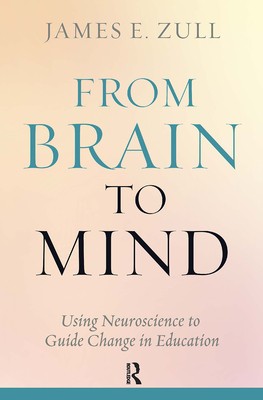
- We will send in 10–14 business days.
- Author: James E Zull
- Publisher: Stylus Publishing (VA)
- ISBN-10: 1579224628
- ISBN-13: 9781579224622
- Format: 15 x 22.6 x 2 cm, softcover
- Language: English
- SAVE -10% with code: EXTRA
Reviews
Description
"A powerful survey of how we learn, offering educators an introduction to what neuroscience can tell us about cognitive development and its links to teaching strategies. From how a brain becomes a mind through experience and how the education process can support that connection, chapters discuss leapfrogging patterns, the biology of motivation, education and memory formation, and much more. Any educator's library should include this."--California Book Watch
Zull begins his journey with sensory-motor learning, and how that leads to discovery, and discovery to emotion. He then describes how deeper learning develops, how symbolic systems such as language and numbers emerge as tools for thought, how memory builds a knowledge base, and how memory is then used to create ideas and solve problems. Along the way he prompts us to think of new ways to shape educational experiences from early in life through adulthood, informed by the insight that metacognition lies at the root of all learning. At a time when we can expect to change jobs and careers frequently during our lifetime, when technology is changing society at break-neck speed, and we have instant access to almost infinite information and opinion, he argues that selfknowledge, awareness of how and why we think as we do, and the ability to adapt and learn, are critical to our survival as individuals; and that transforming education, in the light of all this and what neuroscience can tell us, is a key element in the development of healthy and productive socieities.
EXTRA 10 % discount with code: EXTRA
The promotion ends in 17d.16:36:01
The discount code is valid when purchasing from 10 €. Discounts do not stack.
- Author: James E Zull
- Publisher: Stylus Publishing (VA)
- ISBN-10: 1579224628
- ISBN-13: 9781579224622
- Format: 15 x 22.6 x 2 cm, softcover
- Language: English English
"A powerful survey of how we learn, offering educators an introduction to what neuroscience can tell us about cognitive development and its links to teaching strategies. From how a brain becomes a mind through experience and how the education process can support that connection, chapters discuss leapfrogging patterns, the biology of motivation, education and memory formation, and much more. Any educator's library should include this."--California Book Watch
Zull begins his journey with sensory-motor learning, and how that leads to discovery, and discovery to emotion. He then describes how deeper learning develops, how symbolic systems such as language and numbers emerge as tools for thought, how memory builds a knowledge base, and how memory is then used to create ideas and solve problems. Along the way he prompts us to think of new ways to shape educational experiences from early in life through adulthood, informed by the insight that metacognition lies at the root of all learning. At a time when we can expect to change jobs and careers frequently during our lifetime, when technology is changing society at break-neck speed, and we have instant access to almost infinite information and opinion, he argues that selfknowledge, awareness of how and why we think as we do, and the ability to adapt and learn, are critical to our survival as individuals; and that transforming education, in the light of all this and what neuroscience can tell us, is a key element in the development of healthy and productive socieities.


Reviews